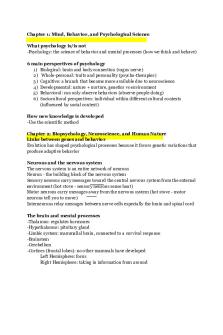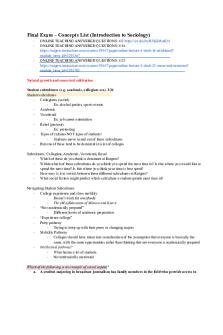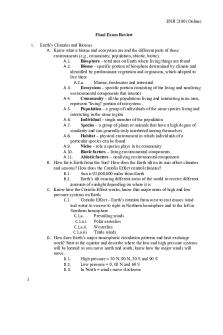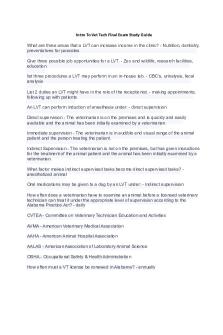Copy of intro to africana final exam PDF

| Title | Copy of intro to africana final exam |
|---|---|
| Author | Jenika Scott |
| Course | Africana Studies |
| Institution | Rutgers University |
| Pages | 26 |
| File Size | 284.7 KB |
| File Type | |
| Total Downloads | 19 |
| Total Views | 138 |
Summary
Exam cheatsheet...
Description
Edward Said - asked profesor why african american history was studied in universities the professor said there is no such things as black literature John Henrik Clarke - wanted to look into black history by asking a lawyer to borrow a book to learn about black history but the lawyer said this is not history recorded about black history 5th grade teacher influenced him he found a book called digging up the negro past Comes to NYC and meets Arthur Schomburg Center that has all info on black history And met Arthur Schomburg and taught him the relationship of african history to world history, political history, and philosophy history.( Afrocentric) Ivan Van Sertima-they came before columbus book but nobody wanted to publish the book for him because it went against the america thoughts about ancient civilization and how columbus was the first person on america. Africans did not come as slaves but came as explorers HIs Hypothesis (Originally Dismissed This Idea but Began To Explore it and found culutral and religious similarities before columbus : ● Black presence was in America before the age of Columbus ● Linguistic Evidence - Leo Weiner (Similarities between African lan. And Native Lang.) ● Cultural Evidence ● Architectural Evidence ● Botanical Evidence ● Accounts of European Explorers Conclusion: People of african ancestry not as slaves but as explorers and traders. They were agents of history rather than produce of history
The Institutionalization of Africana Studies as an Academic Discipline ● Traditionally, college was made for upper class, protestant, white men. They needed centers of knowledge. Kept the rich powerful and knowledgeable knowledge is power. ● WWII changed things. Young men came back from war and the government passed the GI Bill that gave soldiers who fought in the war access to free college education. ● The GI Bill offered free education and federal housing authority was not for blacks) to people who came back from war) began to transform demographics of higher education.Blacks were excluded from this. ● 1950’s and 1960’s brought the Civil Rights Movement & Black Power Movement. ● Students began to call for a change in curriculum.They wanted classes that taught black students about their history. That’s how the field of Africana studies became possible. ● Functions of Africana Studies- DESCRIPTIVE (describes the history), CORRECTIVE (corrects false perceptions of African history), PRESCRIPTIVE (using it to make a difference/social change-prescribing) by Manning Marable ● The Great Migration: 90% of African Americans lived in the South (mostly in Louisiana) and they shifted to the United States for work opportunities. ● Descriptive Function - describe black life & history, analyze the reality of the black experience from black people’s POV.
● Corrective Function - correct dominant myths & stereotypes about Black people. ● Prescriptive function - essential aspect of the struggle to eradicate racism & empower black people. Black People should be treated as citizens Black students have a responsibility to fight for equal rights. Connection between scholarship & social change ● CLR James- 1969 “You don’t play with a Revolution” Paul Robeson resuscitating his memory. ● We forget political Paul Robeson
● ● ● ●
● ●
●
Desegregation Intellectual Consequences Hampton University Howard University-Relevant Black Curriculum Until the mid 50s and 60, black was not allowed to go to historically white schools Integration of white campuses ○ University of Mississippi--James Meredith wanted to go to the university and the state did not allow him (mid 1960s) once there was a larger black presence on these white campuses, courses on Black history/literature started to become more prevalent. Merritt College/ San Francisco- the first school to integrate africana studies(1967) ● Black Power Movement-Black Panther party (Huey Newton and Bobby Seale founders of this party) ○ established this program by accessing student fees ○ They were the reason for the first Africana studies courses ● In 1966, began to fully establish black studies program ● Dr. Nathan Hare - first individual to lead a black studies program at San Francisco state college ● Progressive Coalition ○ called for Africana studies ○ Interracial coalition of student groups that called for Africana Studies ○ together all of these groups call themselves the third world liberation front. ● B lacks fought to- admit more students of color, diversify its faculty, curriculum that deals with race/africana studies, courses on black history/ literature. Activism at Rutgers “After the death of Reverend Dr. Martin Luther King Jr. on April 4, 1968, reactions on the campus of Rutgers University, New Brunswick, New Jersey were ignited by Black students and a few concerned administrators” Dr. Leonard Bethel
● ● ● ●
Conklin hall in Rutgers Newark Feb. 24 1969 2 dozen students took over the building and renamed the building liberation hall stayed in the building until their demands were met Africana studies: a discipline born out of struggle/Africana studies is linked to social mvmt 1950s & 1960s
● 65% Blacks in Newark, but 95% white students at Rutgers Newark ● Student demands for more black students and faculty. They protested at Conklin Hall and sat-in. This protest got the news stations interested and reporting on it. The University negotiated with the students and promised to address some of their concerns. ● DR. Leonard Bethel in charge of Africana studies at Rutgers University ● African American students at the RU Newark Campus took over Conklin hall and named it Liberation Hall. These African American students resided in the building until demands and changes were met. Paradigms in Africana Studies Political Climate of the 1960s/Paradigms in Africana Studies Paradigm - frame of reference, structure of explanation ●
Darlene Clarke Hine ○ 3 major paradigms in Africana Studies ■ Traditionalists ● disciplines to study black experience in America. Recognize there is a gap of existing paradigms from traditional disciplines and fill that gap. How do we use a sociological lens ● Realized there is a gap in existing knowledge. Work within the framework of existing intellectual disciplines (dominant paradigms) and see how they can look at the Black experience in America/abroad ■ Authentists/Afrocentrists ● move beyond a european paradigm. Traditionalists are limited by certain framework and beyond work a european paradigm. ● Rejecting European standards and saying we need to move beyond that and know what African culture/history is. ● Very interested in the history of Africa before the age of European colonialism/what were the achievements of Africa before European encounter
Can’t go to the European paradigm to achieve this because it doesn’t help us to understand African history ● They thought traditionalism was limited. ■ Black Feminists ● Looking at the intersectionalities of race, class, and sex ● More inclusive for black women because feminism was geared more towards white women and the pro-black movement was geared more towards black men. ●
The Age of Empire ● 1492 (Columbus “discovers” America) —> 1945 (end of WWII) ● The age of civilization and barbarism ○ Age of lots of progress (increase in medicine, leading to a longer lifespan), but also several tragedies and problems ● Ngugi wa Thiongo ○ 2 major forces that had a major imprint on the modern world ■ Western Imperialism: the imprint of 5 countries (empire) on the world ■ Resistance: people trying to resist these countries/empires Papal Bull Line of 1493 (Treaty of Tordesillas) - how the Spanish and Portuguese divided the world and what land they owned.
Different But Equal Documentary (Basil Davidson): ● What’s the significance of the title of the documentary? ○ Early historian noted that the various races of the world are different, but equal ○ Development of cultures different, their version of what is considered civilized is different, but they are all equals because we are all human. ○ Regarded as equal because of their civilization achievement. Africans were different, but originally Europeans didn’t assume that they were superior to them. ● How do we know Europeans had respect for Africa before the age of Europe? ○ Renaissance paintings: blacks and whites were portrayed as equals ● What were some of the significant contributions of Africa to human development and human civilization? ○ They hunted, they used animals as transportation. All of this depicted in cave paintings from thousands of years ago.
○ Egyptians: original Egyptians were black, they had a vast civilization, Greek culture was completely inspired by and influenced by the Egyptians. Many Egyptians were Nubians. One of the first societies to invent a written language. They tamed wild African elephants into war tanks. They figured out how to build huge pyramids without the help of many tools that we use today. ● Why did we move from a period in history where Europeans respected Africa to a period in history in which Africans were looked down upon? ○ Racism is only a modern sickness. It didn't always exist. ○ Atlantic Slave Trade: Africans were dragged from their homes and brought to America. Europeans treated them inhumanely and considered them less than equal in order to justify their inhumane treatment towards Africans. Ancient Model vs. Aryan Model ● Ancient model said that Africans were the original successful civilization and all other civilizations were based off of theirs. ● Aryan model said that Europeans were the originals and that other civilizations come from Greece. Afrocentrism vs. Eurocentrism The Diaspora (the resettlement of people from their homeland): ● Home —> Travel —> Relocation/Resettlement ● Eurocentrism ○ is a label that argues that european people have superiority over other people ○ Focuses on European culture/history when discussing history ○ Social science emerged in response to European problems at a point in history when Europe dominated the whole system. As the world began to change, people began to criticize Eurocentrism. These attacks on Eurocentrism is completely justified because it has completely altered many people’s perception of history. ○ Afrocentricity is a reaction to Eurocentrism. It’s a reaction to the problems. ○ is a label for all the beliefs that postulate past or present superiority of europeans over non europeans (and over minority people if non european descent ○ Examples of Eurocentric thought ■ people think the greeks are the prominent culture that influenced cultures all over the world when they got all of their ideas from Africa (Egypt) ■ Colonialism of Africa
The Geography of Empire ○ Imperial Core —> Periphery ○ Everything from the imperial core diffuses to the periphery (the views of the world) ● The Diffusionist School of Thought ○ The idea that civilization started in Europe and spread to other parts of the world ○ Change in the core is autonomous ○ Core —> Periphery ○ The causes of inventiveness is psychological, spiritual, and cultural ○ Periphery: traditional, missing culture of rationality ○ Examples of Diffusionist school of thought: To prove that other continents contributed to the modernization of the world and also to emphasize on the dominant stereotypes about africa. ○ Myth of emptiness ■ When Europeans have settled elsewhere, it was free/available land ■ No people in that land. Narrative that heroes moving westward and taming a wild environment. We don’t talk about the natives that lived there and what happened to them/their culture ○ European cultural view imposed as a universal/dominant world view ■ Ex. Classical music: when we think of classical musicians, we think of Beethoven, Mozart, etc. even though several over cultures have classical music in their history as well. Most people can’t name an African classical musician. Molefi Asante - Afrocentricity- emphasizing african history- He tried to put Africa at the center. ● What is afrocentricity? ○ Places african at the center of their own historical narratives ○ Emphasizing African history ● African agency in history ○ Interested in the history of Africa before the Europeans ○ Africans are victims: slave trade, colonialism, imperialism ○ What’s the role of Africa is making history? He tries to put African agency at the center of analyzing history. ● African positionality ○ Positioning them at the center of the conversation ● African historical accomplishments ○ Paying attention to the accomplishments Africans have made throughout history ●
● ●
●
●
●
Frantz Fanon (1925-1961) Important figure in challenge the Eurocentric view Books he wrote: Black Skin, White Masks (1952) & Wretched of the Earth (1961) ○ Black Skin, White Masks: he’s concerned with the psychological effects of racism/oppression. ■ He looks specifically at language and consciousness. ■ Whiteness depends of the negation of Blackness. ■ Growing up in a world where whiteness is seen as superior and blackness as inferior and the effects that this has on an individual. ■ What does it mean to have a black body in a world that favors whiteness? Algerian War: Alienation ○ Fanon gets involved in the Algerian Revolution ○ Fanon gets involved in the Algerian Revolution and wrote about Colonialism, segregation and dehumanization in the book Wretched of the Earth which took 10 months(1961) ○ During this time, he wrote Wretched of the Earth in 9/10 months before he died of leukemia ■ He’s more concerned with broader political issues such as colonialism, segregation, and dehumanization ■ He argues that the settler makes history ■ The history which he writes is not the history of the country, but the history of his own nation ■ The native is hemmed in, learns to stay in his own place. He was important because he got people to change their views of the world and how they think. Many radical blacks (Malcolm X, etc.) were influenced by him and his teachings. Frantz Fanon (1925-1961) - studies in France and becomes a doctor in psychology. “Black Skin white Masks” (1952) concerned with the psychological effects of segregation. Whiteness depends on the negation of Black. Emphasizes black inferiority. And “Wretched of the Earth(1961). - writes during the Algerian revolution
Africans weren't just victims of history, but they were agents of history. What moves history? ● Neolithic Revolution - Middle East
● ●
● ● ●
○ Invention of agriculture and settlement began in africa. ○ What was Africa’s contribution to ancient history? Emergence of modern civilization. ○ What was Africa’s contribution to modern civilization? The Age of Metals ○ Molding and shaping iron and developing tools out of iron ○ First place to melt iron (modern day Tanzania) Democracy - begins in Egypt Science & philosophy - develops in West Africa Modern State
Elements of Eurocentric Theory and History that Authentics challenges: ● Religion ○ the idea that monotheism is superior to other religions. They are neglecting all other religions. Christianity superior ○ idea that non-western societies had “primitive” religions ● Race ○ Africans are inferior and Europeans are superior ○ Different racial groups with different capabilities ● Environment ○ Idea that African environment is not conducive to development because it's ridden by diseases and warm temperatures which means they can't innovate.( doesn't make any sense) ● Culture ○ European culture is superior to all other cultures. “The notion that black people are human beings is a relatively new discovery in the modern West.” - Cornel West Modern west was built on the degradation of black folk which brings about Africana studies so as to challenge these views. Intellectual Enterprise ● Appropriate “white” centuries ● Culture Hegemony/ Dislocation ● Relocation
Colonialism and Imperialism -(a process by which a group of countries asserts, political, economic and cultural control over another group or country). “The modern world is a product of European Imperialism and the Resistance waged against it by African, Asian and South American Peoples”- Ngugi wa Thiongo ● Colonialism was a powerful force in the modern world. “The sun never sets on the british empire” ● Economic Expansion ● Promotion of a Cultural Worldview (ex. names, speaking english) Globalization started off in the 1500s when the world became integrated.
1492 & Its Aftermath ● Economic Expansion ● Friedrich Ratzel ○ Organic State: in order for any country/nation to become powerful & strong, this nation had to expand and acquire territory ● Slavery/Colonialism ○ These 2 things have a major impact on the Black world ● Political fragmentation of Africa ● 1884-1885: Berlin Conference ○ All major European countries (Britain, France, Germany, Portugal, Belgium, Spain, Italy) came together in Berlin dividing Africa geographically and deciding who gets the land. ○ They had no regard for the African countries themselves. ○ They wanted their “piece of the magnificent African cake” ○ The internal political geography Africa reflects the interests of Europeans, not the indigenous Africans Impacts of Colonialism/Imperialism ● Fragmentation & Division ● Top-Down structures of governments ○ No democracy ○ colonialism: foreign country inserting political control over another country
○ European powers made themselves in control of governments ○ Up until after WWII ● Creates a world after colonizer’s image ○ Indigenous people’s rights are suppressed ○ No democratic accountability ○ You end up with a geography that reflects Europe ● Major negative consequence of colonialism: indigenous people were displaced and lost access to their land. ○ Land becomes a major issue in colonialism. Hut Tax - one of the key economic ways in which Africans lost their land. ● If you own a patch of land, then you have to pay/tax to the European authority to live on that land. ● The Africans were apart of a peasant economy (very vibrant and thriving). This land was owned by their community. The peasant economic system was very successful, especially in South Africa. ● Colin Bundy: The Rise & Fall of the South African Peasantry ○ He looked at how the hut tax system particularly in Southern Africa destroyed the African peasantry. ○ What the system did, it told Africans that they had to pay taxes in European currency. They didn't have European currency, so they had to work for the Europeans to get the money. Nationalism & Liberation: Political movement that seems to find unity against colonial rule. ● Colonialism is a promotion of liberalism ● What is Nationalism? ○ Autonomy, independence, proud of country ○ Political movement that seeks unity for people in order to get rid of colonial rule ○ Having a strong sense of collective identity ○ People in the area/territory know they all belong and they are willing to do whatever for their country. Willing to die to preserve your nation. ○ Gold Coast border was drawn up by Europeans in the Berlin Conference. Yet, the Africans wanted to fight for these borders. After they gain independence, then they will revisit these borders. ○ “We will first seek the political Kingdom although that political kingdom is imposed from the outside.” - Kwame Nkrumah
● Stuart Hall- Nationalist movements- forces of integration- In spite of our differences, let us find some commonalities ❖ Forces of disintegration- After independence some of the nationalists movement fragmented and collapsed. ● Restoration of Community, Assertion of Identity, New cultural practices, Independence ● Neil Smith- The Nation State is a geographical solution to a political problem. Positive Attribute of Nationalism ● Restoration of community ● Assertion of Identity ● New Cultural practices ● Independence Anti Colonial Movements➔ Mau Mau Uprising- Kikuyu People (Kenya Largest Ethnic group that lost their land as a result of colonialism) ➔ Gandhi vs Fanon- Gandhi- Peaceful resistance ❏ Fanon- Violent change. ● UDI- Unilateraton declaration of independence- independents for white only in Rhodesia ○ Africans decided to switch to guerilla warfare- th...
Similar Free PDFs

Copy of intro to africana final exam
- 26 Pages

Intro to Africana Studies Notes
- 5 Pages

Copy of Final Exam
- 78 Pages

Intro To Psych Final Exam
- 24 Pages

Intro to teaching exam notes
- 4 Pages

Final Notes - Intro to Management
- 28 Pages

Intro to psych exam notes
- 32 Pages

Final COPY OF PED001 Reading
- 87 Pages
Popular Institutions
- Tinajero National High School - Annex
- Politeknik Caltex Riau
- Yokohama City University
- SGT University
- University of Al-Qadisiyah
- Divine Word College of Vigan
- Techniek College Rotterdam
- Universidade de Santiago
- Universiti Teknologi MARA Cawangan Johor Kampus Pasir Gudang
- Poltekkes Kemenkes Yogyakarta
- Baguio City National High School
- Colegio san marcos
- preparatoria uno
- Centro de Bachillerato Tecnológico Industrial y de Servicios No. 107
- Dalian Maritime University
- Quang Trung Secondary School
- Colegio Tecnológico en Informática
- Corporación Regional de Educación Superior
- Grupo CEDVA
- Dar Al Uloom University
- Centro de Estudios Preuniversitarios de la Universidad Nacional de Ingeniería
- 上智大学
- Aakash International School, Nuna Majara
- San Felipe Neri Catholic School
- Kang Chiao International School - New Taipei City
- Misamis Occidental National High School
- Institución Educativa Escuela Normal Juan Ladrilleros
- Kolehiyo ng Pantukan
- Batanes State College
- Instituto Continental
- Sekolah Menengah Kejuruan Kesehatan Kaltara (Tarakan)
- Colegio de La Inmaculada Concepcion - Cebu







